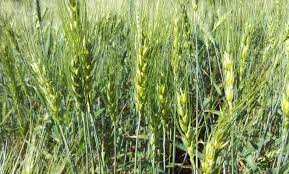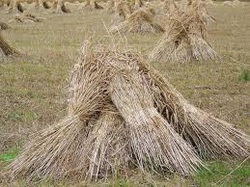
Fragments of wheat DNA recovered from an ancient peat bog under a submerged cliff off the Isle of Wight suggests the grain was exchanged long before it was grown by the first British farmers. No wonder. The grain is nutritious, concentrated, easily stored and transported, and can be processed into various types of food. Although many people are now allergic to wheat, the crop now feeds 30% of the human population and provides 20% of its calories.
Research from the University of Warwick, published in Science, suggests there was a sophisticated network of cultural links across Europe.
Agriculture first appeared in the Near East and then spread along two main routes into Europe. The accepted date of arrival on the British mainland is around 6,000 years ago, as ancient hunter gatherers began to grow crops such as wheat and barley. But before then, wheat could have been traded with the less advanced hunter gatherer society in Britain. There is no sign of the crop being grown in Britain until much later. At that time farming was gradually spreading across Europe.
The research shows that scientists can analyze genetic material preserved within the sediments of the landscapes stretching between Britain and Europe in prehistoric times. The hunter-gather societies of Britain, far from being isolated could have been part of extensive social networks that traded or exchanged exotic foodstuffs across much of Europe before Britain became severed from the mainland.

Wheat is the product of a cross between three different grass species which seems to have happened about 10,000 B.C. In the stone age, man ground grains of wheat with rocks to make flour. Later, man understood that he could grow food as well as hunt food. The ability to sow, reap, and grind cereals may be one of the chief causes which led man to dwell in communities, rather than to live a wandering life hunting and herding cattle. 3,000 BC The Egyptians were the first to produce risen loaves using yeast, probably by accident when beer was used to mix dough instead of water. Pictures and models of the first bread oven is shown in their tombs.
This latest discovery shows that Britain was a civilized society much earlier than previously thought. Love history and finding out about how mankind first developed.
In my co-written dystopian novels, the lovable characters are thrown back to primitive life after the Great Flood. There, I've used my imagination to work out how they would live each day in wild Britland.
They can also be bought from an Amazon near you.
Wind Over Troubled Waters: http://bookgoodies.com/a/B007X57XMS
Knights in Dark Leather: http://bookgoodies.com/a/B00A3EYR0M
Golden Submarine: http://bookgoodies.com/a/B00C8T4O0I
Long Doom Calling: http://bookgoodies.com/a/B00DT6QHFO
Seaweed Ribbons: http://bookgoodies.com/a/B00Q3IVJ1M





 RSS Feed
RSS Feed
